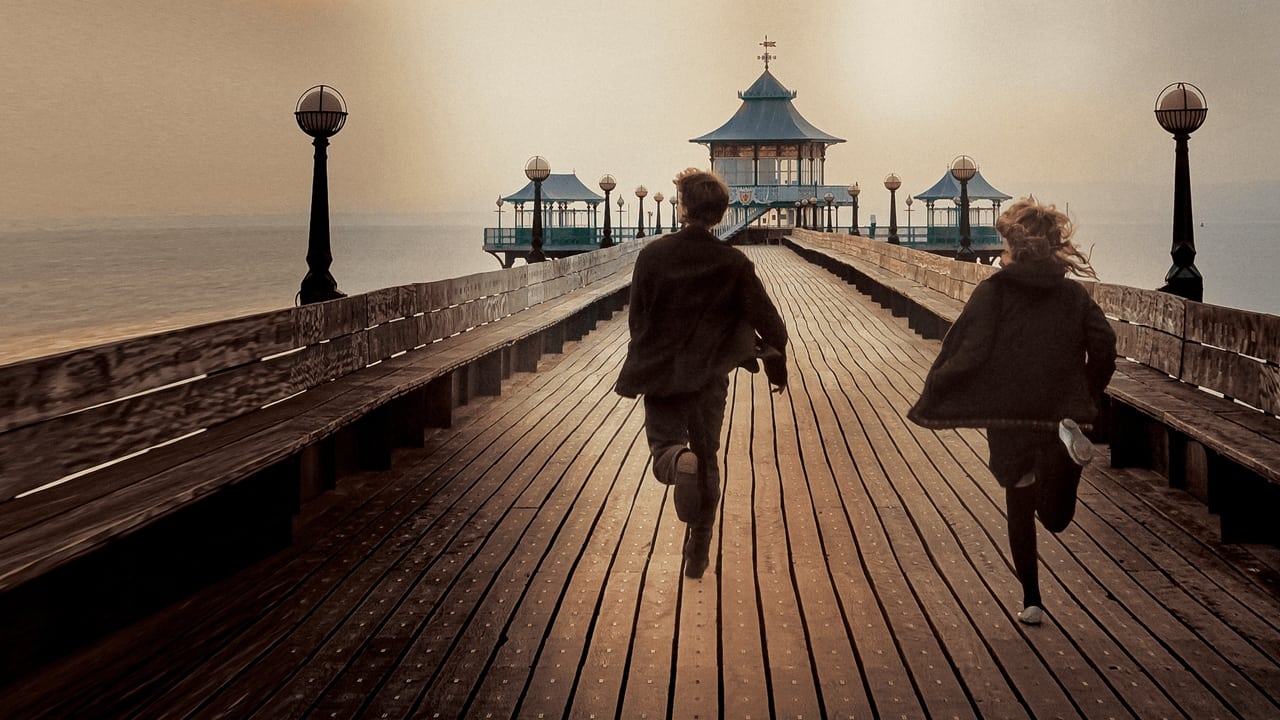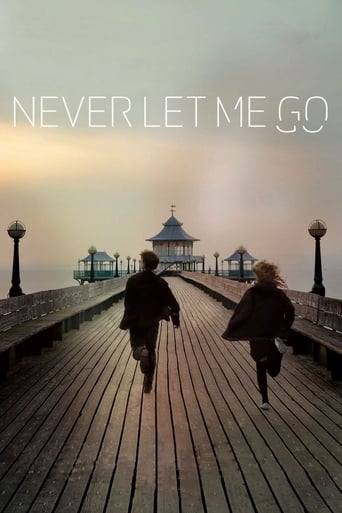

Purely Joyful Movie!
... View MoreAwesome Movie
... View MoreIt’s an especially fun movie from a director and cast who are clearly having a good time allowing themselves to let loose.
... View MoreThe performances transcend the film's tropes, grounding it in characters that feel more complete than this subgenre often produces.
... View MoreNever Let Me Go is a 2010 British dystopian literature film based on Kazuo Ishiguro's novel, Never Let Me Go - written in 2005. The film was directed by Mark Romanek. There are three main protagonists, Kathy H (played by Carey Mulligan), Ruth C (played by Keira Knightley), and Tommy D (played Andrew Garfield). The story follows the trio throughout their short, confusing lives - starting at their strict boarding school, Hailsham, to the Cottages, and to their inevitable "completion" after donations. When the time is right - around mid twenties - every student begins donations, where there organs are removed and unwilling given away for the wealthy's use. Donations occur until "completion", where the life of the donator is complete. In the film of Never Let Me Go, I felt that the time spent showing Hailsham was cut short. Readers of the novel can attest to the fact that Hailsham is where an extensive amount of character development takes place. Hailsham is where Cathy, Ruth, and Tommy show signs of being independent people with their own goals and dreams. It is also the place where the bonds between the three protagonists rise and fall over the course of several pages, showing readers the dynamics between each of the characters. Contrastingly, the growth of characters in the film relies on quickly displaying scenes that highlight the major events that impact the dynamic of trio's relationship. While watching the film, I felt that viewers were rushed through and only shown glimpses of Hailsham - which in turn left me unable to connect to the characters of the film the way I did to the characters of the text. An aspect of the film that was unique to the text was the incorporation of daily pills that students must take and the numbered wristband that kept track of the characters in the text. These helped allow for viewers to conceptualize the hold that Hailsham and the bigger overall system had on the students and their behavior. The addition of the elements added to the dystopia effect. Overall, I feel that the film did a pretty good job of bringing the text Never Let Me Go to life, but fell short in a couple of areas. I believe the selection of actors for roles was handled well, and that setting of the film was excellent. I only wish that more time was spent showing Hailsham, but I'm sure time restraints had a role in the equation.If I had to rate this movie from 1 through 10, 1 being absolutely a piece of garbage and 10 being the best film I've ever seen, I would give it an 8.5.
... View MoreThis is dystopian sf without any sf trappings set, perhaps, in an alternative universe. It's dark, you may want to watch it but if you do, be warned, it's not always easy viewing, either for the emotional content or the story gaps.The 'reveal' is revealed within the first 15-20 minutes but the chances are you might pick up on it earlier.It's not totally original. Check out The Island and if you want to go further back, 1979's Parts: The Clonus Horror.It's based on the book by Kazuo Ishiguro and screenplayed by the usually-brilliant Alex Garland. If you want to delve into the antecedants, Michael Marshall Smith wrote a novel in 1996 called Spares.Given its heritage and gravitas, it seems like sacrilege to criticise this movie but my main doubts occurred early on with the characters' total acceptance of their situation (compare and contrast with The Island) and where the whole world accepts the moral and ethical compass and fortitude shown by their teachers and society. They're free to run around in the world but they have no idea what's going on.It's a big question which the plot studiously avoids.But if you accept it, as do the players, and follow the characters then you'll have an interesting, human, and perhaps even soul-searching journey. Unfortunately, I couldn't ignore this massive plot gap so much of the emotional drama of the situation was lost.Maybe the novel was more profound. The film attempts to be but, alas, it is not.
... View MoreIt's "The Island" for girls. A disturbing, thought-provoking and brilliant film, exploring the meaning of life. Without explosions.
... View MoreThis film has a really expensive cast, which does the original story justice, which was written by the Literature Nobel Prize winner Kazuo Ishiguro. Although Ishiguro moved to England in an early age, his story is heavily Japanese-flavored. Humanity, isolation, despair, love, those are very common themes in Japanese literature. Therefore I feel like a large portion of plot would be better suited for Japanese actors and actresses. It might not be that comprehensible in this side of the cultural gap. Even jarringly inconsistent. For example, the Japanese obsession with vagueness is unique to Japanese culture, and not translatable by language. It is very understandable for Japanese characters to not say something important, even those that must be spoken, in fear of spoiling the present that they so enjoy. Tommy wouldn't tell Ruth that he liked Kathy more because he was unsure of Kathy's feelings. He would be afraid that he would cause Kathy troubles if he rejected Ruth, since romantic rejection for her sake would clearly ruin Kathy and Ruth's friendship. But since Kathy already saw Ruth and Tommy kissing, she wouldn't tell Tommy she liked him in fear of hurting Ruth. Ruth, of course, cared deeply about both her friends, therefore the fragile balance could sustain. But none of those misunderstandings and subtle, beautiful web of love and friendship would be possible in the brutally transparent language that was used in the film. I think the difference might be that it is impossible to tell what an Asian person is feeling by looking at him/her/them, but it is for Westerners, therefore it would all be quicker and easier. Carey Mulligan, being a fan of the book, did a very precise and relatable interpretation of the book. Her performance would satisfy the fan. But Andrew Garfield made Tommy look like a total loser. He said in one of the interviews that Tommy was anxious, so he was trying to spice anxiety into his performance. It doesn't take an expert to tell that he was wrong. Tommy wasn't anxious at all. In fact, he was meticulous, caring, sensitive, endearing. He was powerless yet heartbreakingly firm about defending his love and friends and humanity. He wasn't supposed to make any audience resent or despise Tommy. If he had actually read the book, the movie would be entirely different. But I love his scream at the end. It was very heart-felt and soul-crunching. I was very inspired and shaken by that scream. At least he got that right.Keira Knightly went amiss too. Her Ruth was mean, manipulative, domineering. But a Japanese Ruth would be more considerate, more gentle, more smooth. She would not so openly, easily declare her affections, but would wait until it bursted her and tortured her more than she could bear that she spitted it out. She was supposed to feel like a friend worth having, but did the worst thing for caring. Keira Knightly said in an interview that she didn't understand Ruth's motives. Audience can sense that by watching, and those misunderstandings kind of tore the story apart.I am grateful that someone bothers to make the novel into a movie at all. To convey the cultural and emotional contexts of the novel, they were obviously trying very hard, but to a mediocre success. I can't say Japanese actors would do it any better, since some of them regard acting with a bizarre kind of sportsmanship instead of craftsmanship, pushing themselves into emotional and physical limits instead of thinking with clear heads what the characters were really supposed to do. So I guess it is as good as it can get.
... View More